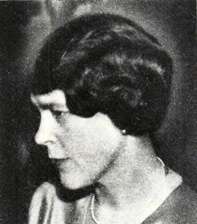Tora Garm-Fex

Tora Garm-Fex (1890–1973) was a Swedish journalist and writer. She was born 1890 in Vänersborg, Sweden to N. O. Jonzon, Håbol (1852–1922)[1] and Emma Carolina Strömberg (1856–1924) and married 1921 to Filip Fex,[2] Stockholm.
She worked as journalist for the following newspapers:
- Dagens Nyheter, Sweden 1914–18
- Vecko-Journalen, Sweden 1918–19
- Stockholms Dagblad, Sweden 1919–24
As correspondent she traveled to Russia, Finland, Italy, France, Scotland, Estonia, Germany and in 1923, on a grant, to Iceland. She became a member of the Swedish Publicists' Association in 1916.[3]
In early 1918 she traveled to revolutionary Russia and Petrograd under the guise as Salvation Army officer and reported back to Dagens Nyheter in Stockholm.[4] At that time German troops had invaded the West Estonian archipelago and threatened Petrograd with bombardment and invasion. It was merely weeks before the Soviets transferred its government to Moscow. During the course of her assignment she met and interviewed key Bolshevik leaders like Vladimir Lenin, Nadezhda Krupskaya, Alexandra Kollontai, Anatoliy Lunacharskiy, Maria Spiridonova and cultural notabilities like the painter Ilya Repin. She also relayed extensive and gritty observations from a street-level Petrograd and, as a consequence, was very nearly killed on several occasions.
Later that same year she published a book, "I bolsjevismens Petrograd" (Aktiebolaget Ljus' Förlag, Stockholm, 1918),[5] about her Russian journey. A highly dramatic and vivid portrayal of a Russia in transition it is now considered a milestone in early Swedish female foreign correspondence.[6] Tora painted a new picture of the traveling reporter as someone who was capable of leaving conformity behind and face the unknown while at the same time maintaining an aura of the normality the reader was used to and could identify with. At the time this was a novel phenomenon in Swedish travel literature.[7] The book told about a society in disintegration but also about how a reporter could appear while on assignment. Furthermore, it did not reflect any ideological preferences but rather displayed an objective view on history in making.[8] Excerpts from the book, for the first time translated to Russian, were published in the November 2017 edition of Russian literary magazine Inostrannaya Literatura.[9]
Tora was also active as film critic[10] and chronicler under pseudonyms like "Masque", "Sita" and "Rosine".
Post-1924 she left journalism behind and settled down to raise a family. In 1965 she recorded her reminiscences for a programme[11] broadcast on Swedish national radio, Sveriges Radio.
References
- ↑ http://www.genealogi.se/portratt/comment.php?id=101558
- ↑ http://runeberg.org/vemarvem/skane66/0262.html
- ↑ Publicistklubbens porträttmatrikel 1936
- ↑ Dagens Nyheters historia : tidningen och makten 1864-2000 - Stig Hadenius - Bokförlaget DN
- ↑ I bolsjevismens Petrograd - Tora Garm - Aktiebolaget Ljus' Förlag, 1918
- ↑ Tidningskvinnor 1690-1960 - Birgitta Ney, Kristina Lundgren - Lund: Studentlitteratur, 2000
- ↑ Hjältereportern – målet för reporterns resa - Johan Jarlbrink - RIG - Kulturhistorisk tidskrift, vol. 89, nr. 2, 2006
- ↑ Rysk spegel: svenska berättelser om Sovjetunionen och om Sverige - Kristian Gerner, Klas-Göran Karlsson
- ↑ Internatsionalnaya Literatura
- ↑ Svensk Filmdatabas - Mästerman (1920)
- ↑ Toras resa rakt in i ryska revolutionen - SR Minnen - Sveriges Radio, Sweden